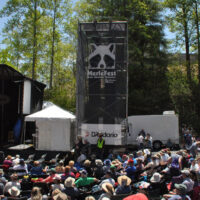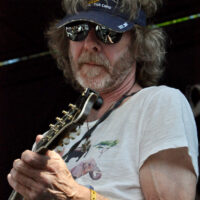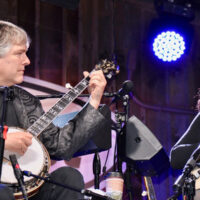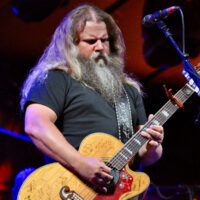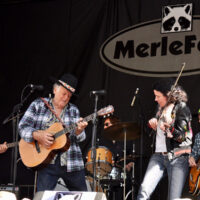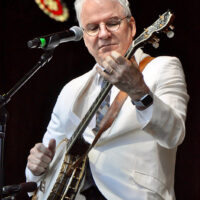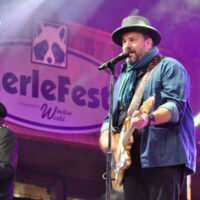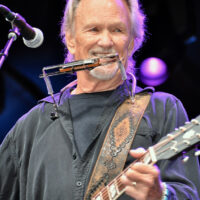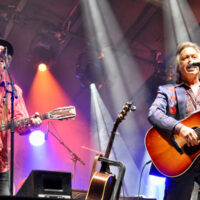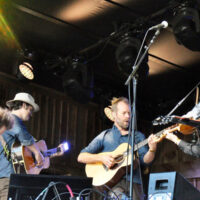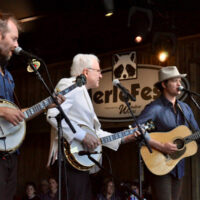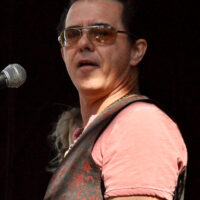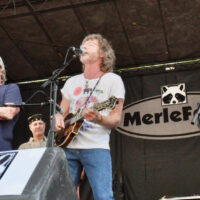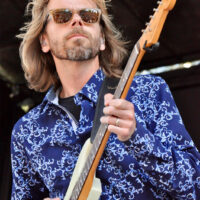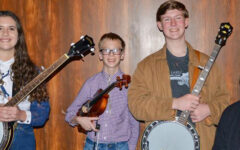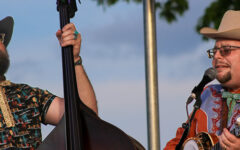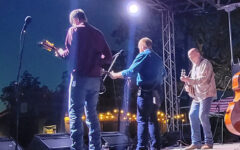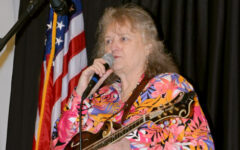
It’s little wonder that MerleFest bills itself as a family-friendly event. The reasons are obvious given the multi-generational mix that runs the gamut from youngsters of the preschool variety (and younger), to older folks with graying hair and a more wizened perspective. Yet, MerleFest’s definition of family extends well beyond the immediate familial bonds. This is, after all, a celebration that’s lasted 31 years, giving repeat visitors a chance to forge friendships that can indeed last a lifetime. It’s also an event that offers equal opportunity for both longtime attendees and newcomers. There are no distinctions that give veterans an upper hand, and those that are prone to cite their experience do so for the sake of helping the novices find their footing, and in the process, quickly feel at home.
Nestled on the campus of the Wilkes Community College in Wilkesboro North Carolina, MerleFest is as close to a home grown pageant as any festival can get. Organized and overseen by the intrepid Ted Hagaman, a longtime member of the school’s administration team, it traces its origins to the initial efforts of bluegrass pioneer Doc Watson, who helped found the festival and named it in honor of his son Merle. Indeed, their legacy still looms large, both in the frequent references made by the performers themselves and in the music which finds a direct connection to those seminal sounds that Doc proffered back in the day when Appalachian music was scarcely known outside its native environs. Today bluegrass, nu-grass and grassicana are thriving art forms, a fact that owes itself entirely to the early efforts of folks like Doc, Merle, Bill Monroe and a handful of other pioneers who passed their lessons down to succeeding generations and added populist appeal in the process.
The music finds any number of places to showcase on the sprawling campus, with no less than seven stages available for the performers to hold court. Unlike its western equivalent Telluride, which boasts but one central stage, four days spent at MerleFest require careful strategizing in order to catch ever artist one hopes to see. It’s no easy task, especially given the fact that many of the headliners do one set and then depart soon after. However, there are any number of regulars who oblige the logistically challenged and eagerly risk overstaying their welcome. Sam Bush, Jim Lauderdale, Donna the Buffalo, Bryan Sutton, Jerry Douglas, Alison Brown, and the Kruger Brothers proved to be the most prolific in that regard, with both Bush and Lauderdale taking it to an extreme. No sooner had their own sets ended than they were suddenly turning up mere moments later in another performance setting.
Indeed the jam sessions are a predominant part of any MerleFest celebration, and all those aforementioned artists are regulars at practically every gathering where a convergence of talent and fraternity are called for. Many of those gatherings are now a regular annual occurrence. The much anticipated Hillside Album Hour, a dedicated salute to a significant album of the vintage variety, is presided over by the Waybacks, and attended by any number of notable guests. Always a closely guarded secret until showtime, this year’s focus was, not surprisingly, on Tom Petty, and several songs that referenced his Florida roots were tossed in for good measure.
The other ongoing all-star gathering consists of Saturday’s Midnight Jam, hosted by Jim Lauderdale, who, in typical fashion, dashed from his set at the Cabin Stage across campus to preside over a steady stream of participating talent that included Town Mountain, Mandolin Orange, Buddy Miller, Frank Solivan and Dirty Kitchen, a Kruger Brother, John Cowan, and more. It began late, but was still only midway through by the time midnight struck. It had been a tiring day, but the massive environs of the Walker Center were nearly full.
There’s a certain equilibrium that takes place between the up-and-coming artists like Lindsey Lou, My Bubba, Richie and Rosie, Rosie & the Riveters, Shinyribs, Scythian, Doolin’, Sarah Jane Scouten, the Barefoot Movement, the Devil Makes Three, the Waydown Wanderers, We Banjo 3, and Cicada Rhythm, and the headliners who are given longer sets on the larger Watson Stage. Nevertheless, there’s also the expected awestruck fascination that comes with a roster which includes Kris Kristofferson, Buddy Miller, Mike Farris, Rodney Crowell, the Mavericks. Robert Earl Keen, Béla Fleck, Abigail Washburn, the North Mississpppi Allstars, Tommy Emmanuel, Rhiannon Giddens, Donna the Buffalo, Peter Rowen, Jamey Johnson, Paul Thorn, the Blind Boys of Alabama, the McCrary Sisters, Jeffrey Foucault, the Steep Canyon Rangers and special guest Steve Martin. Granted, many of these artists performed on their own — special guests are always invited to take part in the proceedings — but the sheer star power of it all indicated that MerleFest is, and always has been, rightly heralded for its headliners.
Even the individual sets that featured nothing more than the core talent involved were elevated to special gatherings. Kris Kristofferson at the ripe old age of 81 may struggle to find his voice in the raspy echoes of his veritable parade of classic compositions, but having Merle Haggard’s sons as part of his backing band added an energy and exuberance that allowed the reprisal of certain standards — the most obvious being Okie from Muskogee — to sound as exhilarating as ever. Paul Thorn practically missed his own appearance due to a mechanical mishap with his transportation, but his all star revue, the Mission Temple Fireworks Revival, was able to get things well underway due to having the Blind Boys and the McCrarys leading the charge. And while festival closers the Steep Canyon Rangers are superb while self-contained, having Steve Martin sharing the stage with Jerry Douglas, Sam Bush and Bryan Sutton making additional cameos just enhanced the entertainment.
“We have an agreement,” Martin noted. “When it stops being fun, we quit.” With that, the Rangers abruptly exited the stage.
Even as he deftly treaded the divide between mirth and music, Martin reminded the audience of a deeper purpose through his and others’ obvious reverence for the traditions that were being celebrated in such a myriad of ways. It was all but impossible to hear the nimble plucking of banjos, the strum of mandolin strings, the frenzied fiddle playing and the acoustic acumen of all the amazing artists and not appreciate the homage they offered to a sound so inherently American in its origins, and yet so international in its appreciation. Music, moments and memories are the key terms that MerleFest trumpets as its mantra, and indeed, those three words sum up the experience succinctly.

